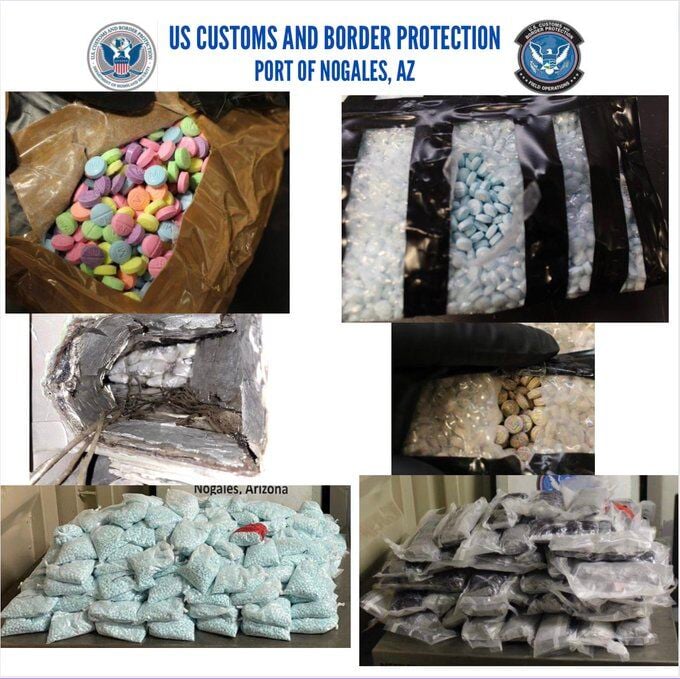The amount of fentanyl seized at Arizona ports of entry continued to break records toward the end of 2022.
Customs officers seized 2,025 pounds of fentanyl at Arizona ports of entry in November, according to federal data released Dec. 23. That’s the most seized on record in one month for any Customs and Border Protection entity.
The fentanyl seized coming into Arizona accounts for more than two-thirds of what CBP seized throughout the entire country in November. That month’s record beats the previous record for Arizona, set in August.
While the amount being seized has steadily grown, the number of seizure events has not. Individual seizures of fentanyl are just much larger than before. In the first two months of the 2023 fiscal year, the average seizure size at Arizona ports was nearly 51 pounds, compared to 18 pounds in 2022.
The amounts of seizures of all other types of drugs have primarily fallen at Arizona ports.
While December numbers have yet to be released, tweets by the Nogales Port Director Michael Humphries show the trend is likely to continue. There were numerous seizures containing large numbers of fentanyl pills throughout December, including more than 1.2 million fentanyl pills seized Dec. 29, more than 1 million in 24 hours on Dec. 21 and 22, and another 736,200 fentanyl pills earlier on the 21st, according to tweets made by Humphries.
Officials estimate there are about 4,000 pills in a pound, so 1 million pills would be about 250 pounds, though that can vary.
The rising amount of fentanyl seized is indicative of both increased technology helping officers find more drugs and criminal organizations smuggling more fentanyl, officials have said.
But the overall amount of drugs seized at the border has decreased in recent years, in part because the demand for illegally imported marijuana has dropped drastically as many states legalize recreational use.
One reason Arizona has become a hotspot for fentanyl smuggling is because the Sinaloa Cartel, in Sonora, is the primary producer of the synthetic opioid, which can come in all shapes and colors, even made to look like prescription medication or rainbow colored. Although the drugs smuggled into the state are intended to go throughout the country, Arizona has not escaped its effects.
Fentanyl overdose emerged as the leading cause of death in youths ages 6-19 in Pima County, according to an October memo from the Pima County Health Department, prompting some schools to stock up on naloxone, also known by the brand name Narcan, which can reverse effects of an opioid overdose.
As well, in 2021, fentanyl overdoses replaced car accidents as the leading cause of death in Pima County for this age group.
More than 95% of fentanyl seizures in Arizona are at ports of entry, rather than smuggled across the border between ports. The main port of entry in Nogales is where the majority of seizures are made.
Fentanyl is often seized being smuggled through ports on pedestrians, in passenger vehicles and on commercial vehicles, concealed inside gas tanks, panels, vehicle batteries and more.
Another driver of fentanyl smuggling is the growing demand from the American public, many officials and experts agree. As well, the vast majority of people convicted of fentanyl trafficking are U.S. citizens, according to the libertarian think tank Cato Institute. In 2021, U.S. citizens accounted for 86.3% of fentanyl trafficking convictions.
When asked if there were any changes on the horizon that would help deal with the influx of fentanyl coming into Arizona, spokesperson Edith Serrano said, “Officers at Arizona ports of entry will remain steadfast on CBP mission priorities to secure the border, which includes keeping dangerous drugs from entering our communities.”
New numbers from the DEA shed light on just how far the opioid epidemic reaches in the United States. The DEA has seized enough fentanyl this year to kill every single person in the U.S.





